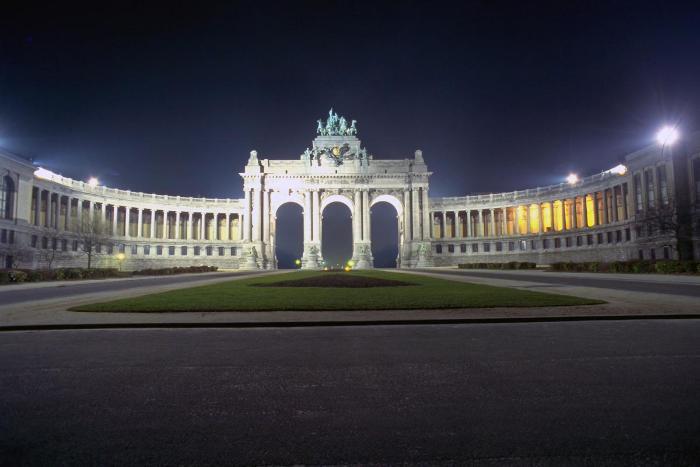
Not long after moving to Brussels, I read these words of John Berger: ‘[In Livorno,] I discovered that I wanted as little as possible to do in this world with those who wield power.
'This has turned out to be a lifelong aversion.’[1]
They have stuck with me. I remember where I was when I read them – on the fast train to Paris, a sunny Friday.
On a personal level, these words are a challenge: Berger puts himself firmly on the side of the dispossessed. My life is not so unequivocal. But although I do not meet his mark, they are words that help me know myself better.
As a writer, these words set me thinking in a different direction. Berger's aversion sent him up mountains and among peasants, becoming a medium for their experience. But literature also thrives on intrigue, and proximity to power brings plenty of that. We know this by our clichés: that contemporary politics is a soap opera; that Theresa May commits hubris, and is thus a tragic figure. Without a literature of power, we would understand it even less.
I am a British-origin poet living in Brussels, earning my wages in public affairs. It would be fair to say that the popular imagination doesn't associate this town with intrigue, but rather with bureaucracy, with compromise. Power of a sort, but not the glamorous sort. Power mediated.
Since we like to praise ‘poets of everyday life’, it is clear that literature also helps us understand the mundane. Here is a poem from some years ago:
Nuit grise
Tic tac tic tac tic tac tic tac tic tac tic tac
tic tac tic tac tic tac tic tac tic tac tic
clack-clack-clack-clack-clack-clack-clack-clack-clack-clack-clack-clack-clack...
At dawn on Mont des Arts, an end-of-winter Sunday,
at the view down to the lower town,
when yours are the only eyes, ears, and there is
no traffic. In such temporarily abandoned space
the pedestrian signal sounds are a typewriter running
dead letters: the regulated sound of regulation
regulating nothing.
Walking home from a party, a road crossing, a structure of rules – all equally mundane. Perhaps it is this town’s professional engagement with such structures that helps them to be uncovered on equal terms. Procedure, or policy, may be the mundane counterpoint to the intrigue of politics; but it is not a widespread concern in literature.
In that piece, understanding of structure doesn’t amount to much more than a pun. This is not dehumanising ‘process’, as in Kafka; it is an activity somewhere between absurd and insignificant. But it will not always be this way:
Zone
“I go where I want”
This vision of freedom
in America, symbolised by
Neil Cassady driving
a stolen car, reckless and drunk
uncoupled from history
We share the aspiration
but not the execution
recognise a greater degree
of responsibility
*
You go where you want, sometimes
you go where you’re told, others
in a continent sodden with historical stuff
you are privileged to enjoy
a degree of autonomy
through communicating administrations
So on an occasion when
you’re going where you’re told,
you will meet in Berlin
Bill Blank, who is trying
to go where he wants
but is obstructed not aided by rules
From that vantage point he can weigh
the competitive advantages in the accidents of birth
the value of smooth procedure
and he is not the only one you know
precariously on the inside
still having to look in
Brussels to Berlin, 9/2015
For a while after writing this piece, I didn’t know how to feel about it. Is it too didactic? At a time when open borders withinEurope were under stress, is what looks like a paean to the Schengen area from a beat-referencing business traveller just decadence?
I have since read Louis MacNeice’s Autumn Journal. It certainly has its didactic, overblown side, but as a whole it manages to integrate the political and the personal. In ‘The next day I drove by night’, MacNeice signals the role of the individual in creating, or defending, the society he or she lives within. Sadly, this is writing from the 1930s which seems pertinent now.
Like technology (indeed, defining it), procedures are not noticed when they work well. In Europe, we have managed to create these procedures between nations to a greater extent than anywhere else. The Schengen area is a reality for the citizens who live within it. It makes life easier – perhaps expands their definition of citizenship. Berger’s aversion to those who wield power has its nobility – but literature also needs to be able to report the experience of living with the decisions they make, to analyse it. So, far from being decadent, if those who benefit from regulation, from international collaboration, don’t recognise it, talk about it, even defend it, who will?
Within a year of writing ‘Zone’, I found myself writing this:
Axiom
Axiom:
HISTORY REPEATS ITSELF
FIRST AS TRAGEDY, THEN AS FARCE
But you propose:
BEHAVIOURS REPEAT THEMSELVES
FIRST AS PARODY, THEN IN EARNEST
With a diplomat friend, you have exchanged
casual emails of the most elaborated politesse
but you increasingly find professional reasons to apply what you have learnt.
A few years ago you bought a BELGIUM-coloured football, a winking declaration
of fealty to the land that hosts you.
Now you are applying for nationality.
Brussels, 7/2016
[1] John Berger, And our Faces, my Heart, Brief as Photos (London: Bloomsbury Publishing, 2005), p.79